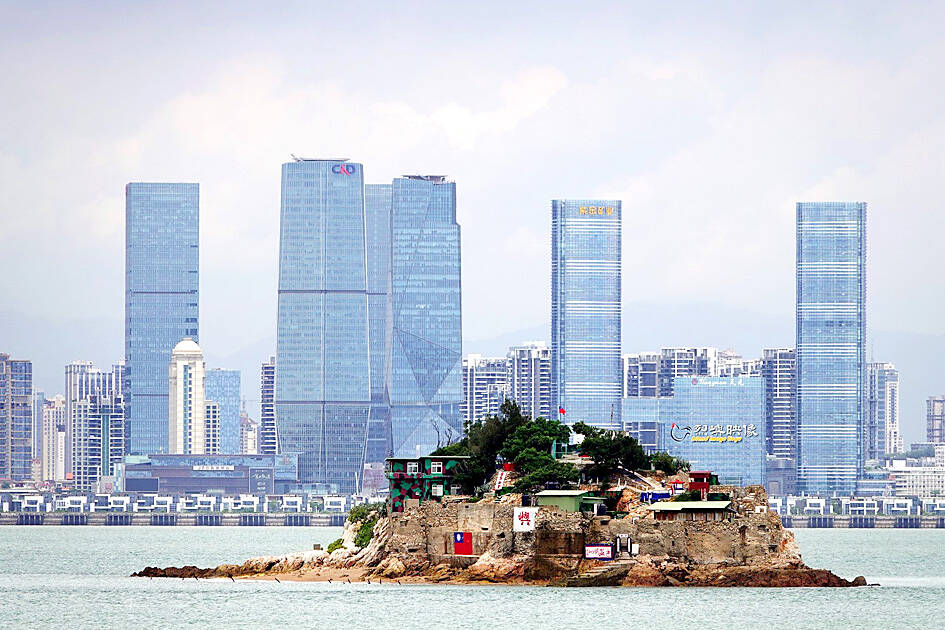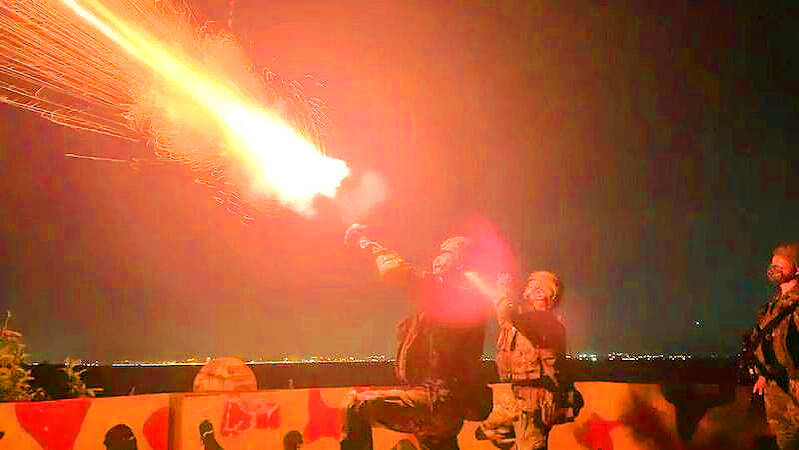Taiwan yesterday downed a civilian drone after weeks of complaints about incursions by uncrewed aerial vehicles from China, a sign Taipei is pushing back against Beijing’s efforts to encroach on its territory.
Taiwanese troops shot the drone down near Kinmen’s Shi Islet (獅嶼) at about noon after attempts to repel it failed, a statement from the garrison on the Taipei-held outpost just off China said.
That followed incidents on Tuesday and Wednesday in which Taiwanese soldiers fired warning shots and flares at civilian drones that approached the nation’s outlying islands.

Photo courtesy of retired Kinmen teacher Hung Ching-chang
The military is trying to reaffirm limits on Chinese presence near its territory after US House of Representatives Speaker Nancy Pelosi visited Taipei early last month.
President Tsai Ing-wen (蔡英文) in a speech on Tuesday urged the military to craft a strong response to China’s pressure campaign without prompting further escalation.
“Drones are part of China’s gray-zone tactics and cognitive warfare against Taiwan,” said Kuo Yu-jen (郭育仁), director of the Institute for National Policy Research in Taipei. “The incursions are an attempt to humiliate Taiwan’s military. Taiwan’s government first responded to it cautiously, and only turned tougher when they became more frequent.”

Photo courtesy of the Kinmen Defense Command
Chinese troops held unprecedented exercises for several days around Taiwan after Pelosi’s visit, including firing ballistic missiles over Taiwan proper.
Taipei has reported that an average of more than 10 Chinese warplanes have crossed the US-drafted median line that divides the Taiwan Strait each day since Pelosi’s visit, data compiled by Bloomberg News showed.
The drones’ flights over the outlying islands started in late July, although neither side has specified where they are coming from.
The Chinese Communist Party’s Global Times newspaper has said that “the frequent flights of civilian drones from the mainland [China] expose the Taiwan armed forces’ weak defenses.”
“China meant to test the response of Taiwan’s military in offshore islands like Kinmen by sending those drones, and also used these small-scale events to see how Taiwanese society responds to them,” said Crystal Tu (杜貞儀), assistant research fellow at the Institute for National Defense and Security Research. “They may also try to see whether there are loopholes in the procedure or response that they can further take advantage of.”
The Ministry of National Defense told lawmakers that China’s encroachments pose “severe military challenges,” a report seen by Bloomberg said.
Major General Lin Wen-huang (林文皇), who is in charge of combat planning at the ministry, told reporters that Taiwan would repel Chinese forces if they were to enter its territory.
“The closer the incursions are to Taiwan, the stronger our countermeasures will be,” Lin said.

Seventy percent of middle and elementary schools now conduct English classes entirely in English, the Ministry of Education said, as it encourages schools nationwide to adopt this practice Minister of Education (MOE) Cheng Ying-yao (鄭英耀) is scheduled to present a report on the government’s bilingual education policy to the Legislative Yuan’s Education and Culture Committee today. The report would outline strategies aimed at expanding access to education, reducing regional disparities and improving talent cultivation. Implementation of bilingual education policies has varied across local governments, occasionally drawing public criticism. For example, some schools have required teachers of non-English subjects to pass English proficiency

‘FORM OF PROTEST’: The German Institute Taipei said it was ‘shocked’ to see Nazi symbolism used in connection with political aims as it condemned the incident Sung Chien-liang (宋建樑), who led efforts to recall Democratic Progressive Party (DPP) Legislator Lee Kun-cheng (李坤城), was released on bail of NT$80,000 yesterday amid an outcry over a Nazi armband he wore to questioning the night before. Sung arrived at the New Taipei City District Prosecutors’ Office for questioning in a recall petition forgery case on Tuesday night wearing a red armband bearing a swastika, carrying a copy of Adolf Hitler’s Mein Kampf and giving a Nazi salute. Sung left the building at 1:15am without the armband and apparently covering the book with a coat. This is a serious international scandal and Chinese

TRADE: The premier pledged safeguards on ‘Made in Taiwan’ labeling, anti-dumping measures and stricter export controls to strengthen its position in trade talks Products labeled “made in Taiwan” must be genuinely made in Taiwan, Premier Cho Jung-tai (卓榮泰) said yesterday, vowing to enforce strict safeguards against “origin laundering” and initiate anti-dumping investigations to prevent China dumping its products in Taiwan. Cho made the remarks in a discussion session with representatives from industries in Kaohsiung. In response to the US government’s recent announcement of “reciprocal” tariffs on its trading partners, President William Lai (賴清德) and Cho last week began a series of consultations with industry leaders nationwide to gather feedback and address concerns. Taiwanese and US officials held a videoconference on Friday evening to discuss the

PERSONAL DATA: The implicated KMT members allegedly compiled their petitions by copying names from party lists without the consent of the people concerned Judicial authorities searched six locations yesterday and questioned six people, including one elderly Chinese Nationalist Party (KMT) member and five KMT Youth League associates, about alleged signature forgery and fraud relating to their recall efforts against two Democratic Progressive Party (DPP) legislators. After launching a probe into alleged signature forgery and related fraud in the KMT’s recall effort, prosecutors received a number of complaints, including about one petition that had 1,748 signatures of voters whose family members said they had already passed away, and also voters who said they did not approve the use of their name, Taipei Deputy Chief Prosecutor